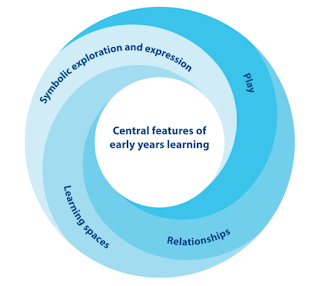Principled
In a series of blog posts, I have focused on different attributes of the learner profile and how they might be modelled and developed in Kindergarten. The last attribute I will focus on is principled, defined by the IB in the following way: "We act with integrity and honesty, with a strong sense of fairness and justice, and with respect for the dignity and rights of people everywhere. We take responsibility for our actions and their consequences."
Central features of learning in the early years are represented in this graphic taken from The Learner document as part of From Principles into Practice:
Play is (or should be) central how young children learn. As they learn about turn taking and make compromises in their decision making, children are faced with the challenges and opportunities of fairness, honesty and responsibility. These are some of the many benefits when children play games and learn to share resources.
Relationships are key to learning. Young children are socialising and communicating with those beyond their own families. In doing so, they learn about the importance of friendships and the qualities of being a good friend. Acting with integrity and having empathy and respect for others are part of developing trustful relationships. Interactions with others are reflected on and times that children take responsibility for their actions are noticed and named. Becoming principled connects beautifully to self-regulation.
Learning spaces are imperative to young children's learning. Whether indoors or outdoors, onsite or in local neighbourhood, these spaces should promote collaborative thinking, cooperative play and curiosity. Young children act as agents of their own learning and learn to negotiate different materials and parts of the learning spaces. Routines are established and reflected on to ensure the learning space is as effective as it can be and that children are responsible members of the classroom community.
Symbolic exploration and expression is natural to how children make sense of and demonstrate their understanding of the world in a variety of modalities such as drawing, language, construction, movement and number. Having a shared language in the classroom to model, notice and name behaviours and dispositions is important. Abstract concepts such as honesty, fairness, rights and responsibility can be difficult for children to understand without concrete examples for them to visualise. Role play, read alouds and illustrations all help children to develop understanding of being principled, as well as using the everyday interactions children have as they play.
As with all attributes of the learner profile, some key strategies to embed them in classroom culture include:
Modeling - If we want children to be fair, honest and responsible, we need to show the same qualities.
Noticing and naming - Monitor and document examples of the children being principled, and then use these occasions to notice and name the attribute - either in the moment or later on in reflection
Stories - Use literature, animations, song lyrics and film clips to discuss examples (or non-examples) of being principled. Invite children to make their own connections and listen to the stories that they share.
Opportunities - When young children have the chance to think for themselves, be curious in a culture of inquiry, socialise and communicate in their play, and develop independence and self-regulation as they manage their time, belongings and emotions, they learn in a world of possibility. Learning spaces rich in open-ended resources and agency require learners to make their own decisions and think carefully about the consequences of their choices. Opportunities to be, and reflect on being, principled are rich in authentic learning as the children own these moments themselves.
What strategies do you use to explore being principled?
What might you try in the coming weeks?




Comments
Post a Comment